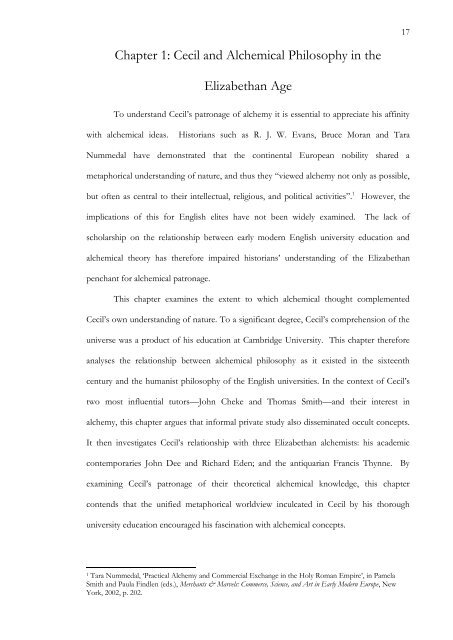The Alchemical Patronage of Sir William Cecil, Lord Burghley
The Alchemical Patronage of Sir William Cecil, Lord Burghley
The Alchemical Patronage of Sir William Cecil, Lord Burghley
Create successful ePaper yourself
Turn your PDF publications into a flip-book with our unique Google optimized e-Paper software.
Chapter 1: <strong>Cecil</strong> and <strong>Alchemical</strong> Philosophy in the<br />
Elizabethan Age<br />
To understand <strong>Cecil</strong>‘s patronage <strong>of</strong> alchemy it is essential to appreciate his affinity<br />
with alchemical ideas. Historians such as R. J. W. Evans, Bruce Moran and Tara<br />
Nummedal have demonstrated that the continental European nobility shared a<br />
metaphorical understanding <strong>of</strong> nature, and thus they ―viewed alchemy not only as possible,<br />
but <strong>of</strong>ten as central to their intellectual, religious, and political activities‖. 1 However, the<br />
implications <strong>of</strong> this for English elites have not been widely examined. <strong>The</strong> lack <strong>of</strong><br />
scholarship on the relationship between early modern English university education and<br />
alchemical theory has therefore impaired historians‘ understanding <strong>of</strong> the Elizabethan<br />
penchant for alchemical patronage.<br />
This chapter examines the extent to which alchemical thought complemented<br />
<strong>Cecil</strong>‘s own understanding <strong>of</strong> nature. To a significant degree, <strong>Cecil</strong>‘s comprehension <strong>of</strong> the<br />
universe was a product <strong>of</strong> his education at Cambridge University. This chapter therefore<br />
analyses the relationship between alchemical philosophy as it existed in the sixteenth<br />
century and the humanist philosophy <strong>of</strong> the English universities. In the context <strong>of</strong> <strong>Cecil</strong>‘s<br />
two most influential tutors—John Cheke and Thomas Smith—and their interest in<br />
alchemy, this chapter argues that informal private study also disseminated occult concepts.<br />
It then investigates <strong>Cecil</strong>‘s relationship with three Elizabethan alchemists: his academic<br />
contemporaries John Dee and Richard Eden; and the antiquarian Francis Thynne. By<br />
examining <strong>Cecil</strong>‘s patronage <strong>of</strong> their theoretical alchemical knowledge, this chapter<br />
contends that the unified metaphorical worldview inculcated in <strong>Cecil</strong> by his thorough<br />
university education encouraged his fascination with alchemical concepts.<br />
1 Tara Nummedal, ‗Practical Alchemy and Commercial Exchange in the Holy Roman Empire‘, in Pamela<br />
Smith and Paula Findlen (eds.), Merchants & Marvels: Commerce, Science, and Art in Early Modern Europe, New<br />
York, 2002, p. 202.<br />
17















